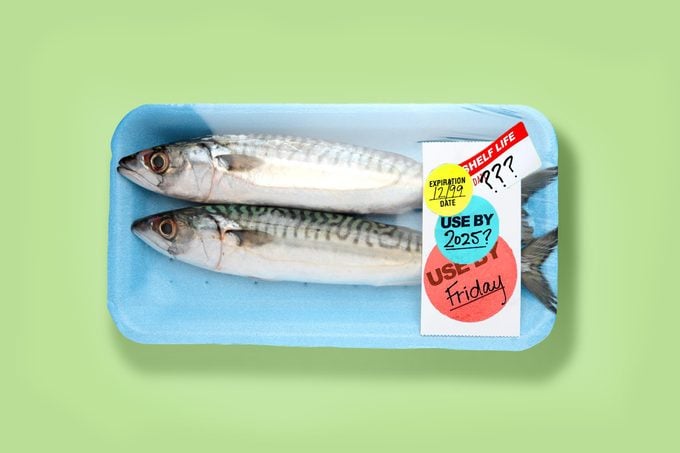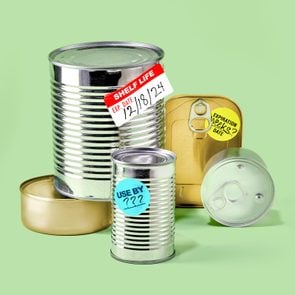How Long Does Fish Last in the Fridge?
Updated: Mar. 01, 2024
It’s essential to know how long both raw and cooked fish last in the fridge to ensure your meal isn't swimming with harmful bacteria

If you open your fridge and you’re hit with a stinky smell, there could be something fishy going on. ( Learn how to get rid of stinky fish smell from the kitchen.)We’re often told to eat more seafood, and in fact, the USDA recommends eating eight ounces a week to support brain and heart health. The only time that isn’t true? When you’re eating fish that’s gone bad. But how long does fish last in the fridge? The answer is tricky—not as tricky as figuring out how long other food lasts in the fridge, such as pinpointing when eggs expire, but still tricky.
Sure, sell-by dates serve as a good indicator, but there are other variables that will affect that answer. For example, what if you thawed out frozen fish with the best intentions of cooking it for dinner but then decided to go out to eat? Or what if the fish in your fridge is already cooked—does that change things? You also need to consider fridge organization and storage guidelines. Here’s what you need to know when trying to decide if that fish you want to make for dinner is still safe to eat.
How long does raw fish last in the fridge?
Generally speaking, raw fish can last in the fridge for about two days, says Martin Bucknavage, a senior food safety extension associate at Penn State. “You want to eat it as soon as you can,” he adds. “You don’t want to buy raw fish to cook three, four or five days later.” This goes for all fish, including salmon and tuna. It also applies to frozen fish that was transferred into the fridge to thaw.
To make sure the fish in your fridge lasts as long as possible, consider what kind of shape it’s in when you buy it at the store. “You want to be sure to buy it from a fish counter where someone is monitoring the temperature,” says Bucknavage. If fish isn’t kept at the proper temperature, it will not only have a shorter shelf life but may also put you at risk for food poisoning, since harmful bacteria can form on fish that isn’t kept below 40 degrees. Also pay attention to how it looks and smells. “It should smell like the ocean but not overly ‘fishy,'” says Bucknavage. In terms of how it should look, the flesh should be firm, and the scales should be intact.
When fish starts going bad—at the store or in your fridge—you will notice the color, texture and smell start to change. The fish scent will become stronger, which is a sign of the proteins breaking down. It may also feel slimy and develop a grayish tint.
How to store fish in the fridge
How you store raw fish in the fridge matters too. Make sure the fish is completely sealed so it isn’t exposed to air or moisture. Where should you store raw fish in a refrigerator? Bucknavage recommends keeping it in the coldest part of the fridge, which is the bottom shelf, in most fridges. It’s also best to store your fish away from other foods, including meat and produce, to avoid the transfer of harmful bacteria.
How long does cooked fish last in the fridge?
Let’s say you already cooked your fish, and now you have leftovers. How long does salmon last in the fridge, and how long does tuna last in the fridge? And what about shrimp, sole or your other favorites? In all cases, it’s the same. “Generally, cooked fish will last in the fridge for three or four days,” Bucknavage says. As with raw fish, it’s important to make sure you’re storing your leftover fish properly. An airtight container will prevent it from being exposed to air or moisture.
And if the color or odor of the fish has changed, toss those leftovers—regardless of how long they’ve been in your fridge. While many people are mindful of the bacteria that can grow on raw fish, they sometimes forget that the same thing can happen to cooked fish. Like other foods, when fish starts to spoil, it can develop harmful bacteria including brochothrix thermosphacta, carnobacterium piscicola and lactobacillus plantarum. These can cause symptoms including an upset stomach, vomiting, diarrhea and a fever, at best, and kidney or brain damage, at worst.
How long will fish last in the freezer?
Like other foods, fish lasts a lot longer in the freezer, so if you’re at the store and want to buy fish but aren’t sure when exactly you’ll be eating it, you may be better off buying it frozen. When storing your fish in the freezer, Bucknavage says to put it in the coldest part (aka away from the front or doors) and to make sure your freezer is set to the ideal temperature of 0 degrees. Frozen raw fish can last in the freezer between three and eight months, and frozen cooked fish can last in the freezer for up to three months, according to the USDA.
It’s also important to make sure your fish doesn’t get freezer burn, which happens when frozen foods are exposed to cold, dry air. “Freezer burn causes the surface of the food to dehydrate,” Bucknavage says, adding that the dry area can then go rancid. “To avoid freezer burn, you want to get your fish in the freezer as soon as possible and make sure it’s properly stored in a container that prevents it from being exposed to air and moisture.”
How to tell if fish has gone bad
Even though you now have some definitive answers on how long food lasts in the fridge and freezer, it’s still helpful to keep an eye out for these telltale signs that your fish has gone bad:
- Overly fishy smell
- Slimy texture
- Grayish or bluish tint
- The flesh has lost its firmness (for raw fish)
“Food is expensive, especially fish,” says Bucknavage. “So properly storing your fish and being mindful of when you’re going to eat it are good to consider.” With these tips in mind, you’ll save money, waste less food and stay safe.
Next, find out how long chicken lasts in the fridge and what you need to know about storing produce properly.
Sources:
- Martin Bucknavage, senior food safety extension associate at Penn State
- Innovative Technologies for Food Preservation: “Main Groups of Microorganisms of Relevance for Food Safety and Stability”
- FDA: “Are You Storing Food Safely?“
- USDA: “How Long Can You Store Fish?”



